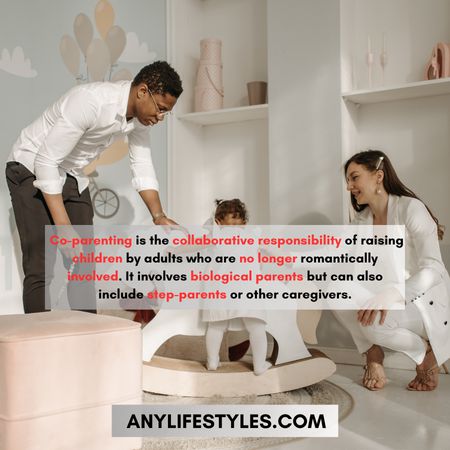Beginning a new relationship is exciting, but co-parenting while in a relationship becomes crucial for those with children from a previous relationship. It can be challenging when a former partner enters a new relationship, as this dynamic can significantly impact your children’s lives.
It’s essential to approach co-parenting with this new person positively and constructively. Balancing a romantic relationship with co-parenting responsibilities may seem daunting, but it is possible with the right mindset and tools.
Establishing open and honest communication with your partner about parenting goals, expectations, and concerns, as well as maintaining effective communication with your co-parent, ensures both parties are aligned in raising your children.
This article explores the key elements of successful co-parenting while in a relationship, offering insights and practical tips to help couples navigate this journey with confidence and positivity.
What Is Co-Parenting?
Co-parenting is the collaborative and shared responsibility of raising children by two or more adults who are no longer romantically involved. Typically, it involves biological parents, but it can also include step-parents or other significant caregivers.

Co-parenting focuses on ensuring children’s well-being and stability, providing a supportive and loving environment despite family changes. Effective co-parenting involves clear communication, mutual respect, and prioritizing the children’s needs over personal differences.
Successful co-parenting fosters a sense of security and normalcy for children, helping them adjust better to the separation or divorce of their parents and maintain healthy relationships with both parents.
By focusing on the best interests of their children and fostering a cooperative parenting partnership, co-parents can create a nurturing and positive environment that promotes the well-being and development of their children.
Introducing Your Child to New Partner
When co-parenting in a relationship, introducing your child to a new partner requires a thoughtful and sensitive approach. It’s essential to understand that your child may have mixed emotions and need time to adjust to this new dynamic.
Introducing a new partner can increase challenges, such as adjusting to shared authority and gaining children’s respect. However, by setting boundaries and prioritizing the child’s needs, a harmonious co-parenting setup can be achieved.
Firstly, ensure that your relationship with your new partner is stable and long-term before making the introduction. Preparing your child is also important. Have age-appropriate conversations to explain that you have met someone special whom you would like them to meet.
Introducing a new partner to your child requires patience, understanding, and empathy. Approach it with compassion and prioritize your child’s emotional well-being to facilitate a positive relationship between your child and your new partner.
Importance of Communication in Co-Parenting Relationships
You need to constantly communicate with your co-parent if you want to build a healthy and effective co-parenting relationship that benefits your child. Effective communication is key to ensuring that both parents are on the same page and that their parenting decisions are consistent.

Without communication, misunderstandings can arise, which can lead to conflict and ultimately harm the child’s well-being. Communication is especially important when co-parenting in a relationship because it involves more than just discussing parenting decisions.
It also involves discussing the relationship and how it affects the child. By being open and honest with one another, co-parents can build trust and work together to create a supportive environment for their children.
Balancing Romantic Partnership and Co-Parenting Roles
Finding a balance between romantic partnership and co-parenting can be challenging, but it is important to prioritize communication and mutual respect. It is important to recognize that these two roles are distinct and require different approaches.
While co-parenting focuses on the children’s well-being, romantic partnership focuses on building a strong and healthy relationship between the partners. One way to balance these roles is to establish clear boundaries and expectations.
It is important to communicate openly about each other’s needs and roles in the relationship and co-parenting. This will help avoid misunderstandings and conflicts that may arise when one partner feels neglected or unsupported in either role.
8 Tips for Successful Co-Parenting While in a Relationship
Successful co-parenting while in a relationship requires effective communication, mutual respect, and a collaborative approach. Here are some key strategies to help ensure a harmonious and balanced co-parenting dynamic:
1. Consistency in Parenting:
Align your parenting styles and rules with your co-parent to provide a consistent environment for your child. Consistency helps children feel secure and understand expectations.
2. Prioritize Your Child’s Needs:
Always keep your child’s best interests at the forefront of your decisions. Ensure that their emotional, physical, and psychological needs are met, and provide a stable and loving environment.
3. Support Each Other – Co Parenting While in a Relationship:
Be supportive of your co-parent and your partner. Recognize and appreciate their efforts in parenting and the relationship, and work together as a team.

4. Effective Conflict Resolution:
Address conflicts promptly and constructively. Use effective conflict resolution techniques, such as active listening and compromise, to resolve issues without escalating tensions.
5. Balance Quality Time – Co Parenting While in a Relationship:
Manage your time effectively to ensure that you spend quality time with both your child and your partner. Plan activities that include everyone as well as separate bonding time for each relationship.
6. Encourage Positive Relationships:
Foster positive relationships between your child and your partner. Encourage them to spend time together and build their connection, while also respecting your child’s pace and comfort level.

7. Practice Patience and Empathy:
Understand that co-parenting while in a relationship is an evolving process. Be patient with yourself, your child, and your partner, and approach each situation with empathy and understanding.
8. Seek Professional Help if Needed:
If you encounter persistent challenges, consider seeking guidance from a family therapist or counselor. Professional support can provide valuable insights and strategies for managing complex dynamics.
Conclusion:
Co-parenting while in a relationship can be a challenging but rewarding experience. It requires effective communication, clear boundaries and expectations, and the ability to navigate differences in parenting styles. However, when done right, co-parenting can be a fulfilling experience for everyone involved.
One of the key factors in successful co-parenting is maintaining a balance between your romantic partnership and your co-parenting roles. It’s important to prioritize the needs of your children while also nurturing your relationship with your partner.
Remember, co-parenting is a journey, and like any journey, there will be ups and downs. But with patience, love, and dedication, you can create a beautiful and fulfilling life for yourself, your partner, and your children.









